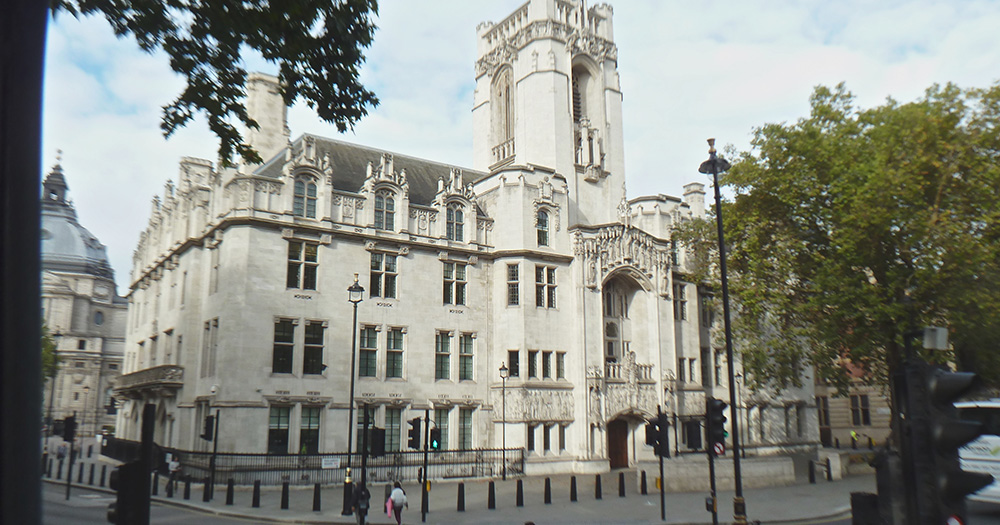In April 2025, the UK Supreme Court ruled that the legal definition of ‘woman’ under the Equality Act 2010 does not include trans women. In the wake of the decision, several Irish trans and non-binary people living in the UK discuss its impact on their lives.
The recent Supreme Court decision in the UK came as a shock to some, but to many, especially transgender people themselves, it wasn’t surprising amid the rise in anti-trans sentiment. The decision has created a dangerous waiting game where, in the months immediately after, we are now waiting to see how this will be interpreted by the general public, businesses and services.
As a non-binary person, I have watched the ruling with interest and fear from Nottingham, where I’m based. I moved here from West Cork, and it’s only in the freedom of an anonymous city, away from home, that I have found the space to question, change and accept my gender. However, I know not everyone around me will accept it, and I, too, have felt the change in atmosphere.
In April 2025, the Supreme Court ruled that the legal definition of a woman is based on biological sex. This could have far-reaching implications for single sex spaces and services. It came after the Scottish government included trans women in quotas to ensure gender balance on public sector boards. The group For Women Scotland argued that protections should only apply to those who were born female.
Many Irish LGBTQ+ organisations condemned the decision in the UK, with Transgender Equality Network Ireland (TENI) calling it “an effort to erase trans women from many sectors of society.” In July, 10,000 people marched as part of Trans & Intersex Pride Dublin, a record-breaking number, as many stood in solidarity with their UK trans siblings.
However, where does that leave those of us caught in limbo between the two countries?
It’s always been a strange position for those of us who are Irish and trans but living in the UK. It has created an invisible line in the sky, which we cross midflight, where our rights change. Many of us are in England due to factors beyond our control, or preference, such as the housing crisis, recession and healthcare costs.
For Sam McCarthy, they hope that moving to the UK from Cork next year will help lessen the cost of gender affirming healthcare, but they are worried about the transphobia they could face from GPs.
“The Supreme Court decision wasn’t surprising to me, so it hasn’t affected my decision to move. The UK political landscape is unfortunately catering and pandering to this rhetoric, and I’m expecting things to continue in this vein for a while,” they said.
“It gives the public the green light to harass anyone they see as using the ‘wrong bathroom.’ This does concern me as I’ve only just started using the men’s bathroom as I was starting to get odd looks in the women’s.”
They added: “I think overall, transphobia is worse in England. The TERF narrative is firmly ingrained in the public consciousness in England, and that comes through on personal and political levels. To me, England seems to be regressing, whilst Ireland is progressing, albeit very slowly.”
That is the thing, the law change has created a problematic situation where the general public feels happy in policing people based on body and image assumptions, which are often incorrect. This is true of a queer friend of mine whose entrance was blocked in a straight nightclub because a group of women wrongly believed she was transgender.
It’s not just about the day-to-day experiences, but also, there are larger questions around the ‘what-ifs’ that have so far gone unanswered.
Aodh came to Manchester from Dublin after their partner was offered a job during the pandemic. He had transitioned before moving, but recognises the financial benefits of the UK in bills, rent and the NHS. While it hasn’t impacted their daily life, they recognise that it could affect them if something were to happen.
“I haven’t been too impacted by the Supreme Court decision, but I have friends who are scared to pee in public. I have seen people talking about moving to Ireland as an escape from the UK. I don’t think transphobia has such a big impact on my daily life, but it’s there as a spectre. If I were to end up in the hospital, then it would be an issue.”
For many of us living abroad, the pull of Ireland, of home, is strong. I often wonder, if queer rights continue to be rolled back in the UK, would I consider moving back? The uncomfortable answer is, we’ll see.
© 2025 GCN (Gay Community News). All rights reserved.
Support GCN
GCN is a free, vital resource for Ireland’s LGBTQ+ community since 1988.
GCN is a trading name of National LGBT Federation CLG, a registered charity - Charity Number: 20034580.
GCN relies on the generous support of the community and allies to sustain the crucial work that we do. Producing GCN is costly, and, in an industry which has been hugely impacted by rising costs, we need your support to help sustain and grow this vital resource.
Supporting GCN for as little as €1.99 per month will help us continue our work as Ireland’s free, independent LGBTQ+ media.
